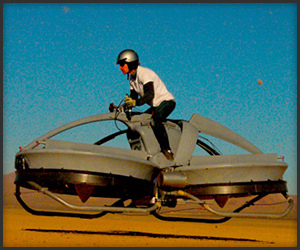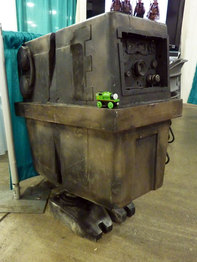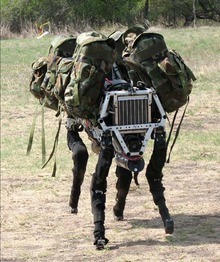Co-authored by Robert Benefer (Moderator at The Weird News Daily)
These days technology is everywhere we look; in our pockets, on our desks and peppered throughout our homes. None of it seems strange or out of place. Take a moment to imagine looking at it with eyes from ten or fifteen years ago however, and you'll realise that we are walking around and interacting with pieces of science fiction that have become pieces of science fact.
It's no secret how fast new technologies and advances are happening at the minute (it seems like there is a new version of an existing product every other month) but what I'm asking is, how much of these advances are from designers filling a need/ergonomic specification and how much is derived from engineers watching a film or playing a game and thinking "Wow! When I grow up I really want a hot tub that's also a time machine!" (I'm still holding out for that one!)
On the surface it doesn't really seem that apparent but if you stop and think about it there are numerous times that the Sci-fi genre has blatantly affected the flow of technology. For example, the mobile telephone below is an example of a top of the range Motorola DynaTAC 8000X from 1985. In 1988 the Cyberpunk Role-Playing Game written by Mike Pondsmith and published by R. Talsorian Games listed in its rulebook (top right) a "Mini Cell" in the equipment list and the picture artwork looks phenomenally close to a flip phone from the early 2000's. If we go back even further in the original Star Trek TV series (1966-67) have you ever noticed how much the 'communicator' looks like a flip phone? (Bottom, center). Maybe the designers of such phones were not thinking of practicality or design features when they made it. Maybe they just wanted Scotty to beam them up.


(Motorola DynaTAC 8000X (left), Star Trek 'communicator'(right) All images sourced from Bing.com license free gallery)
But it's not just phones or even the public sector that are affected in this way; military applications are also often lifted from sci-fi too. For instance, the GNK Power Droid as spotted from many of the Star Wars films (1977 onwards) can be seen bumbling around as a walking battery and equipment carrier for whoever owns it. In recent years the US military have developed "The Mule" which serves in very much the same way, a droid that can follow its user, carrying equipment and spare batteries for its squad. How long before we see a repair droid helpfully fixing things like R2D2?
Staying with the military theme, Aliens the 1986 sequel to Alien directed by James Cameron, introduced us to the M56 Smart Gun. Following suit, the US military trialed a heavy machinegun mounting system with camera based targeting just like that seen in the film. As it stands, this is one piece of tech that landed in the "nice idea, but no" pile, as they couldn't figure out a way of making it accurate enough due to recoil. It didn't stop them trying though!
So, is science fiction leading us to some of the greatest technological breakthroughs? Well it would seem like it's at least a good jumping off point. It's not just the forethought, imaginative ideas sometimes happen by accident or for sheer convenience. The teleporters from Star Trek, for example, were originally in the series because they couldn't afford to show shuttles landing on the planets surfaces. It was easier to 'fuzz' out the character and change the scene. Recently Prof Hanson, from Delft University of Technology in the Netherlands, has managed to transfer atoms up to three meters with 100% accuracy and has plans for bigger experiments in the future. Would the Prof have conducted this research if it wasn't popularized by Star Trek?
But what's next?
Personally, with technology advancing as it is, I think the next big thing to come out of Science Fiction will be "wet wear" as seen in Burning Chrome a collection of short stories written by William Gibson. "Wet Wear" is where digital data is stored on hard drives for ease of data transference but the processer that uses is the human brain. How would you like to download Kung-Fu like in The Matrix? Or perhaps 'copy and paste' Steven Hawking's knowledge into your head to help with your physics homework?
This method of development isn't a bad thing. Quite frankly if it means that they are going to invent swoop bikes from Star Wars for me to play on, so be it!


(Swoop Bike (above, top) and the developed 'Hoverbike (above, bottom) All images sourced from Bing.com license free gallery).
With Science-Fiction having been stereotyped as the entertainment of the 'nerd' or 'geek' perhaps it is no coincidence that many of those so called nerds/geeks made an insane amount of money by pioneering many of the world's most profitable online tools back when the web was young. Now, we have a nerd/geek super race who have virtually unlimited resources. Every one of them likely a fan of one sci-fi or another and now wielding the financial muscle to turn their childhood dreams into reality. One obvious example is Larry Page (co-founder of Google), who has gone on to back an asteroid mining company.
If you take one message away from this article it should be this. Spare a thought for those pioneering nerds, geeks and dreamers when using your next piece of cutting edge technology; you may owe your thanks by proxy to a Jedi or a starship captain.
Allan Lennon (Founder of The Weird News Daily)


